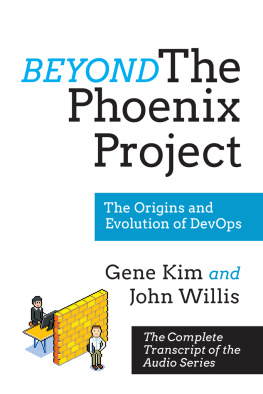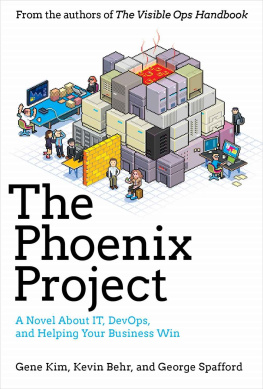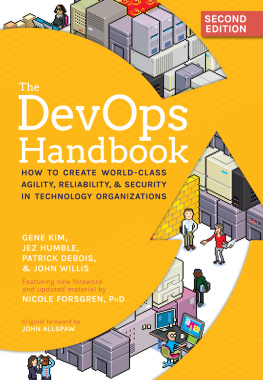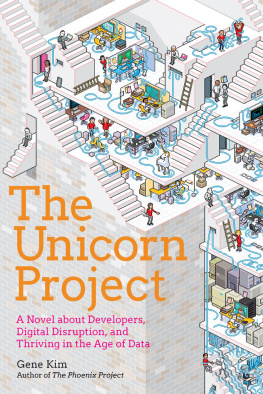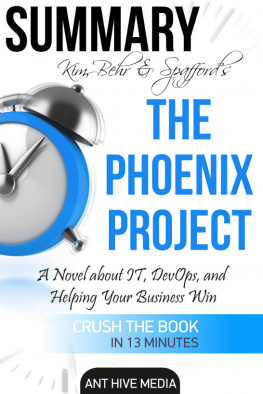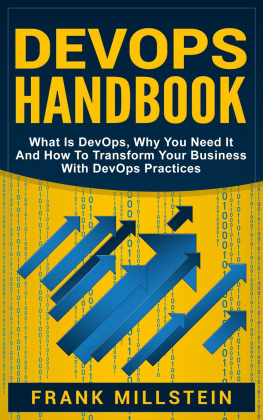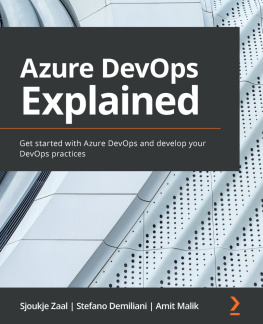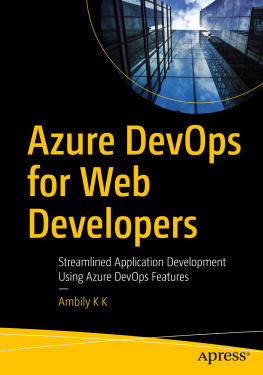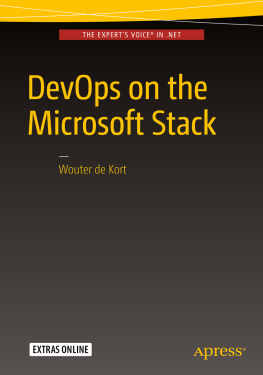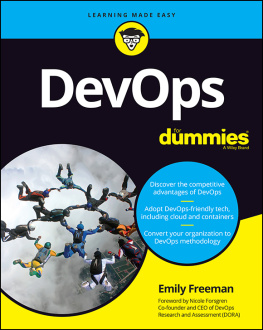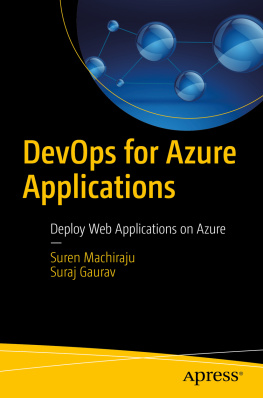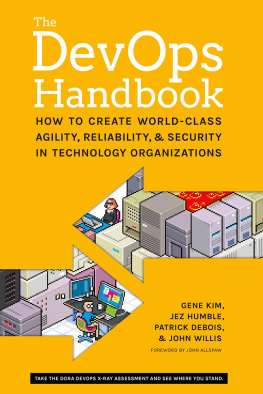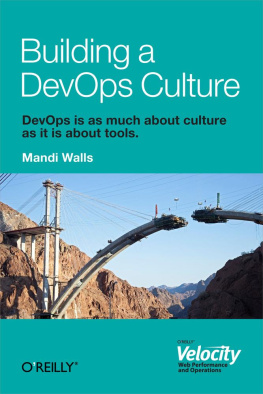


25 NW 23rd Pl, Suite 6314
Portland, OR 97210
This work is a transcript of the audio recording of Beyond The Phoenix Project
Copyright 2018 by Gene Kim and John Willis
All rights reserved, for information about permission to reproduce selections from this book,
write to Permissions, IT Revolution Press, LLC, 25 NW 23rd Pl, Suite 6314, Portland, OR 97210.
First Edition
Printed in the United States of America
23 22 21 20 19 18 1 2 3 4 5 6 7 8 9 10
Cover and book design by Devon Smith
eBook ISBN: 978-1942788256
Kindle ISBN: 978-1942788263
Web PDF ISBN: 978-1942788270
Special thanks to Dr. Sidney Dekker, Dr. Steven Spear, and Dr. Richard Cook
for their participation in the 2017 DevOps Enterprise Summit.
For information about special discounts for bulk purchases
or for information on booking authors for an event,
please visit our website at www.ITRevolution.com.
Beyond The Phoenix Project
Contents
Module 1
The Phoenix Project
John Willis: Hey Gene, its been a wild ride. I think the first time we met was actually on a panel.
Gene Kim: Thats right! DevOps Days 2010 Mountain View.
John: Thats right, and the joke was I was on a panel with you. I think it was Patrick Debois, who we considered the godfather of DevOps, made a joke about my age or something like that. And you made some compliment to me, and it was one of those things where I knew who you were but I didnt know who you were. And you said, Oh, he doesnt look that old!
Then I got off the stage, and our good friend Damon Edwards says, Do you know who that was?
I was like, I dont know, panel guy number four?
He goes, No, thats Gene Kim!
Im like, Gene Kim! Oh, my God! I was trying to chase you down, and I think that was the first time we met. What was interesting is I think we agreed to meet at South by Southwest, and we had a really long conversation about this thing we call DevOps. And I think we had a meeting of the minds of what it meant to me, what it turned out it meant to you.
Gene: Yeah, absolutely, and Ill never forget that interaction, because you had told me over drinks that DevOps was important because IT operations has been lost at sea for thirty years, and DevOps is how were going to find our way back. In that moment I knew that I was talking to a true kindred spirit, and we were genuinely on the same mission of how do you elevate this through the practicenot just for development but also for operations, where I think both of us would say is where we came from.
John: Then we started having discussions about how to further the discussion about this thing called DevOps, and you had basically informed me that you were working on this mission you had about this book that was based on some guy that at the time I didnt really know. One of the other favors you did for me is, I was Ooh, can I read a copy of the book? and you said, John, you should actually read this book first. That book was Eliyahu Goldratts The Goal . So I read it, I fell in love with it, and it was just...I think that started our journey of this thing that weve been working together. So, I guess, what inspired you to write The Phoenix Project ?
Gene: So, as you had mentioned, it is because of Dr. Goldratts book called The Goal . Its a famous book that was written in 1984, and its a novel about a manufacturing plant manager who has to fix his cost and due date issues in ninety days, otherwise theyll shut the entire plant down. Whats amazing is that you see the entire world through the heros eyes: Alex Rogo, the young plant manager.
What Dr. Goldratt does so effectively in the book is really talk about all the things that go wrong in manufacturing that resonated so well with the entire manufacturing community, and uses that as a platform to put forth a set of very unconventional, counterintuitive things that he called the Theory of Constraints.
When I read that book, oh my goodness, probably seventeen, eighteen years ago, it was just so powerful to me. And Ive never worked in manufacturing. Ive certainly never been a manufacturing plant manager. But it was obvious that so many of the lessons being imparted in that book were relevant to the work that we did all the time in technology. I think the other thing that resonated was the notion that storytelling would be such an amazing vehicle, to be able to tell the entire world that this is the problem that were trying to solve through things like DevOps.
I think the last thing Ill mention is that the impact of The Goal is difficult to overstate. Its been integrated into almost every mainstream MBA curriculum, into almost every mainstream Ops management course in terms of operations management. So, I think it just shows how powerful storytelling is as a vehicle to get people on board.
John: Yeah Gene, the whole storytelling narrative of The Goal and then The Phoenix Project , I think its really interesting. Because one of the interesting themes that always comes out when people talk to me about The Phoenix Project is, How did Gene sneak into my building? Then Ill ask them, Did you read The Goal first?
As some people [say], I havent read The Goal but I have read The Phoenix Project . Even when I read The Goal the first time. You said, John, read The Goal first, which was a gift that you gave me. Because I think if I would have read The Phoenix Project first, I wouldnt have had the sense of the narrative moving forward. But in both books, even when I read The Goal , I got the sense of, I know that character. I know that character.
I love when people tell me, It seems like Gene snuck into my building when he wrote The Phoenix Project .
Gene: Yeah, its so interesting to study Goldratt because he did talk about the years after The Goal was published, and he said he would get these letters in the mail from people saying, You must have been hiding in my manufacturing plant. I know these characters, I know these disasters. That person that is being described is me!
So, I think that was just a great testament to how great of a vehicle The Goal was for being able to say, Hey, I understand the problems that are happening. So, I think a design objective of The Phoenix Project , of the co-authorsso that was Kevin Behr, George Spafford, and myselfwe obviously want[ed] to create the same reaction in our readers, saying, Holy cow, whats happening to Parts Unlimited, the fictitious company being depicted in The Phoenix Project , is whats happening to us.
It doesnt even matter whether were a developer or in operations or security, whether were in technology or within the business. The story being described is what we feel every day. I think an additional design objective was to say theres this downward spiral that is happening in the organization, and its actually getting worse over time. So, that was something we wanted to bring to life in The Phoenix Project .
John: The other thing, I think...its all about timing. The first DevOps Days in Mountain View where we met in 2010, there was this explosion of people trying to figure out a better way to do things. Meanwhile, you had been working on this project for a number of years that just fell in at a perfect time to describe a narrative of what people were experiencing in this thing called DevOps that was just starting to explode.
Next page
